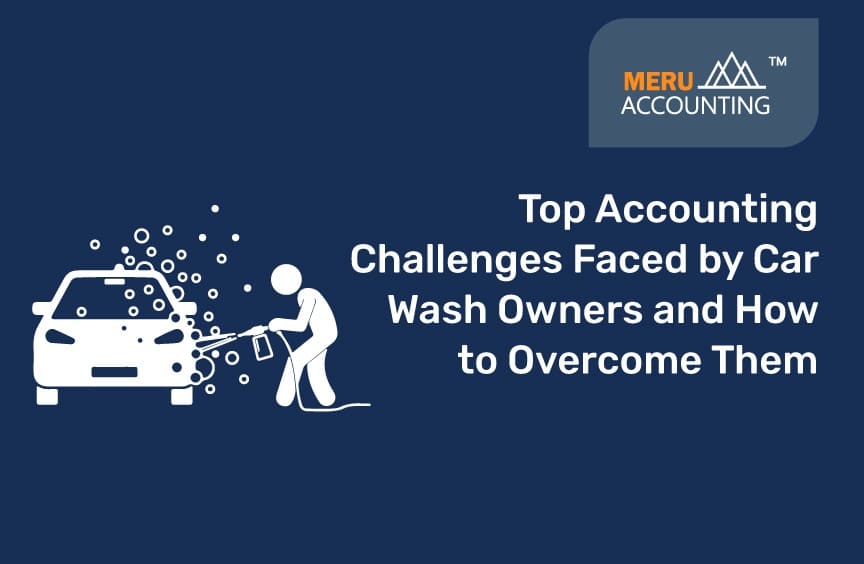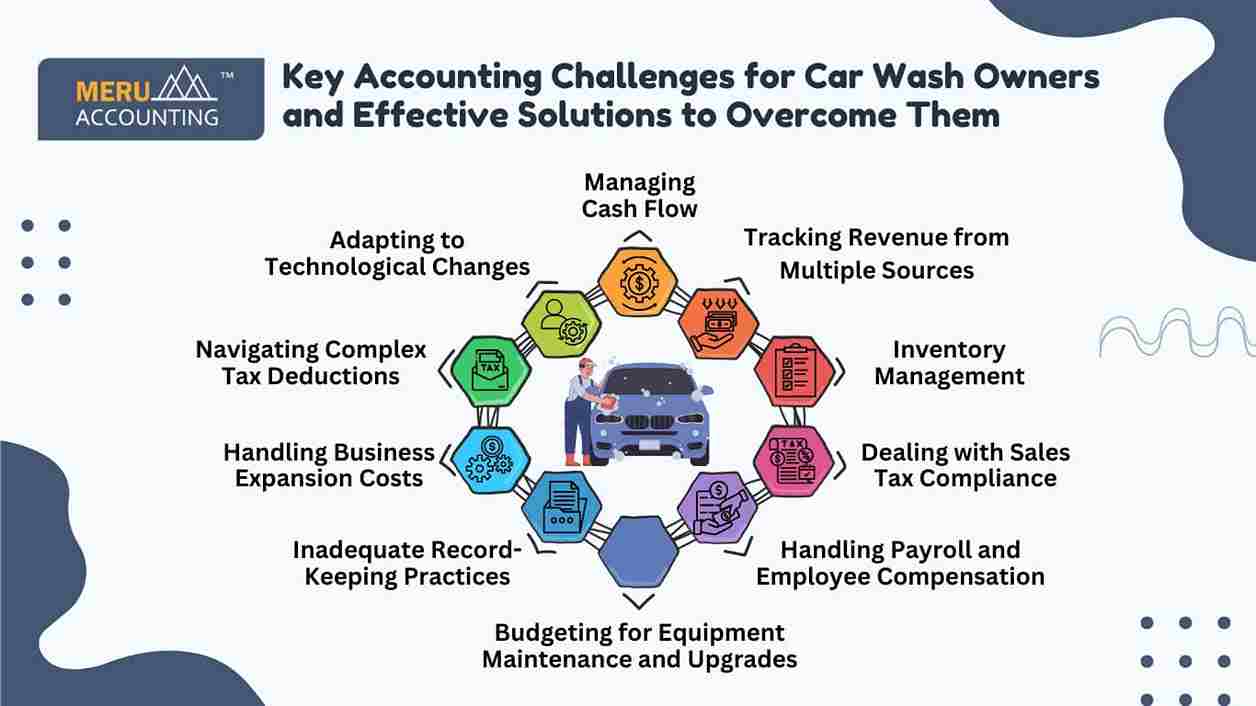
Top Accounting Challenges Faced by Car Wash Owners and How to Overcome Them
Running a car wash business comes with its own unique set of accounting challenges. From managing cash flow to tracking inventory, car wash owners must stay on top of their finances to ensure smooth operations. Here are some common accounting challenges faced by car wash owners and practical strategies to overcome them.
Key Accounting Challenges for Car Wash Owners and Effective Solutions to Overcome Them
1. Managing Cash Flow
Car wash businesses often experience fluctuating cash flow due to seasonality and customer traffic variations. Maintaining a consistent cash flow can be challenging, especially during off-peak seasons.
Solution:
- Cash Flow Forecasting: Regularly practicing car wash accounting can update cash flow forecasts to anticipate shortfalls and surpluses. This helps in making informed decisions regarding expenses and investments.
- Emergency Fund: Set aside an emergency fund during peak seasons to cushion against lean periods.
- Flexible Payment Options: Offer flexible payment methods, including memberships, pre-paid packages, and subscription services to create a steady income stream.
2. Tracking Revenue from Multiple Sources
Car washes can generate income from multiple sources, such as wash services, detailing, vending machines, and merchandise. Car wash bookkeeping and tracking revenue streams separately can be challenging, leading to inaccurate financial records.
Solution:
- Use an Accounting Software: Invest in car wash accounting software tailored for car wash businesses that can categorize and track income from different sources.
- Integrate Point-of-Sale (POS) Systems: POS systems help in accurately recording sales, providing detailed reports for each revenue stream.
- Monthly Revenue Reconciliation: Regularly reconcile the revenue collected from different sources to detect discrepancies and ensure accurate reporting.

Hire A Dedicated Team
That Grows With You, Flexible, Scalable and
Always On Your Side
3. Handling Payroll and Employee Compensation
Car washes often employ a combination of full-time, part-time, and seasonal workers, leading to complex payroll management. Additionally, some employees may receive commission-based compensation.
Solution:
- Automate Payroll Processes: Use payroll software that calculates wages, taxes, commissions, and overtime automatically.
- Outsource Payroll Services: If managing payroll becomes too time-consuming, outsourcing payroll processing can help reduce errors and ensure compliance.
- Track Employee Hours Accurately: Utilize time-tracking tools to log employee hours accurately and avoid disputes over pay.
4. Inventory Management
Car washes use various supplies such as cleaning chemicals, brushes, and towels, which need to be restocked regularly. Ineffective inventory management can result in either overstocking or shortages, affecting cash flow and operations.
Solution:
- Implement Inventory Management Software: Use software that tracks inventory levels in real-time and provides alerts for low stock.
- Set Minimum and Maximum Inventory Levels: Establish stock thresholds to trigger automatic reordering when supplies run low.
- Regular Inventory Audits: Conduct periodic audits to compare physical inventory with recorded data to identify discrepancies.
5. Dealing with Sales Tax Compliance
Sales tax regulations can vary by state, and car wash owners must keep track of different tax rates for services, products, or equipment sales. Failing to comply with sales tax regulations can lead to penalties.
Solution:
- Stay Updated on Tax Laws: Regularly review state and local sales tax laws to stay compliant.
- Automate Sales Tax Calculations: Use car wash accounting software that automatically calculates sales tax based on the location and type of service or product.
- Hire a Tax Professional: Consult with a tax advisor to ensure compliance and optimize tax savings.
6. Budgeting for Equipment Maintenance and Upgrades
Car wash equipment requires regular maintenance and occasional upgrades, which can be expensive. Many car wash owners struggle to budget for these costs effectively.
Solution:
- Set Up a Maintenance Fund: Allocate a portion of monthly revenue for maintenance and equipment upgrades.
- Schedule Preventive Maintenance: Regularly practicing car wash bookkeeping can maintain equipment to prevent costly breakdowns.
- Lease vs. Buy Analysis: Consider leasing equipment instead of purchasing it outright to spread out the cost over time.
7. Inadequate Record-Keeping Practices
Accurate car wash bookkeeping and record-keeping is essential for tracking expenses, calculating profits, and filing taxes. However, many car wash owners neglect proper documentation, leading to inaccurate financial reporting.
Solution:
- Standardize Record-Keeping Procedures: Develop standard operating procedures for documenting all financial transactions.
- Use Cloud-Based Accounting Solutions: Cloud-based software ensures that records are accessible, organized, and securely stored.
- Regular Bookkeeping Reviews: Perform monthly reviews of financial records to catch errors early and ensure accuracy.
8. Handling Business Expansion Costs
Expanding a car wash business involves significant costs, including new equipment, real estate, and marketing. Managing these expenses without straining the existing budget is a challenge.
Solution:
- Create a Detailed Expansion Plan: Outline the costs and revenue projections to assess the feasibility of expansion.
- Seek Financing Options: Explore different funding options such as business loans, leasing, or investor partnerships to support the expansion.
- Monitor Post-Expansion Performance: After expansion, track financial performance closely to ensure it aligns with projections and adjust strategies as needed.
9. Navigating Complex Tax Deductions
Car wash owners can benefit from various tax deductions, such as equipment depreciation, utility costs, and business-related travel. However, identifying and applying these deductions correctly can be challenging.
Solution:
- Work with an Experienced Accountant: An accountant familiar with the car wash industry, who can help in car wash accounting and also enables to identify eligible deductions and optimize tax savings.
- Maintain Detailed Records: Keep thorough documentation of all expenses to substantiate tax deductions.
- Utilize Accounting Software: Accounting software can automatically categorize deductible expenses and streamline tax preparation.
10. Adapting to Technological Changes
With advancements in technology, car wash businesses must adapt to new systems for payment processing, inventory management, and customer engagement. Implementing these changes can be overwhelming.
Solution:
- Embrace Digital Solutions Gradually: Introduce new technologies in phases, starting with the most critical areas, such as payment systems.
- Train Employees on New Technologies: Ensure staff is well-trained to use new tools effectively.
- Seek Professional Help for Integration: Work with a consultant to integrate new technologies smoothly with existing systems.
Conclusion
Accounting challenges in the car wash industry can be daunting, but with the right strategies and tools, including car wash accounting and car wash bookkeeping owners can streamline their financial management. By implementing these solutions, car wash businesses can improve profitability, ensure compliance, and position themselves for growth.
For professional accounting and bookkeeping services tailored to the car wash industry, consider partnering with Accounts Junction. Our team of experts can help you overcome these challenges, ensuring your financial records are accurate and compliant.

